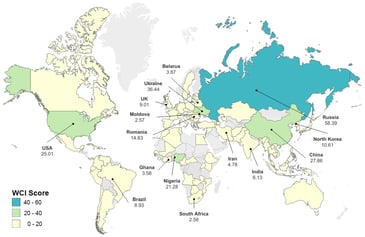 In a groundbreaking study that spanned three years, an international research team, including experts from the University of Oxford and UNSW Canberra, has developed the first-ever World Cybercrime Index.
In a groundbreaking study that spanned three years, an international research team, including experts from the University of Oxford and UNSW Canberra, has developed the first-ever World Cybercrime Index.
This Index ranks nations based on their contribution to global cybercrime, offering unprecedented insights into the cyber threats emanating from specific countries.
Published in the esteemed journal PLOS ONE, the World Cybercrime Index reveals that a few countries are the major players in the cybercrime arena. Russia, Ukraine, China, the U.S., Nigeria, and Romania are at the forefront, housing the most significant cybercriminal threats globally, with the UK also making the top ten.
Dr. Miranda Bruce, a co-author of the study, emphasized the utility of this Index in strategic resource allocation for combating cyber threats. By identifying major cybercrime hubs, both public and private sectors can optimize their cybersecurity efforts, focusing on regions posing the greatest threats and economizing on resources elsewhere.
The study's methodology involved a comprehensive survey of 92 cybercrime experts worldwide, who assessed various countries across five major categories of cybercrime. These experts ranked countries based not only on the volume of cybercrime originating from these locations but also on the sophistication and skill levels of the perpetrators.
Associate Professor Jonathan Lusthaus highlighted the challenges in tracking cybercriminals, who often conceal their locations behind digital masks and fake profiles. The Index, therefore, serves as a critical tool in peeling back these layers of anonymity, providing a clearer picture of the cybercrime landscape.
Moreover, the research points to the potential for identifying emerging cybercrime hotspots, allowing for preemptive actions in countries at risk before they develop significant cybercrime issues. This proactive approach could be pivotal in curbing the global spread of cyber threats.
Professor Federico Varese from Sciences Po in France further noted that the study is just the beginning of a more extensive investigation into the factors that foster cybercrime within specific national contexts. Future research will explore how variables like educational attainment, internet penetration, GDP, and corruption levels might correlate with cybercrime activities.
The World Cybercrime Index marks a significant step in understanding and combating cybercrime globally. By pinpointing where these criminal activities are most concentrated, cybersecurity professionals can better prepare and respond to these evolving threats, ultimately making the digital world a safer place for everyone.






